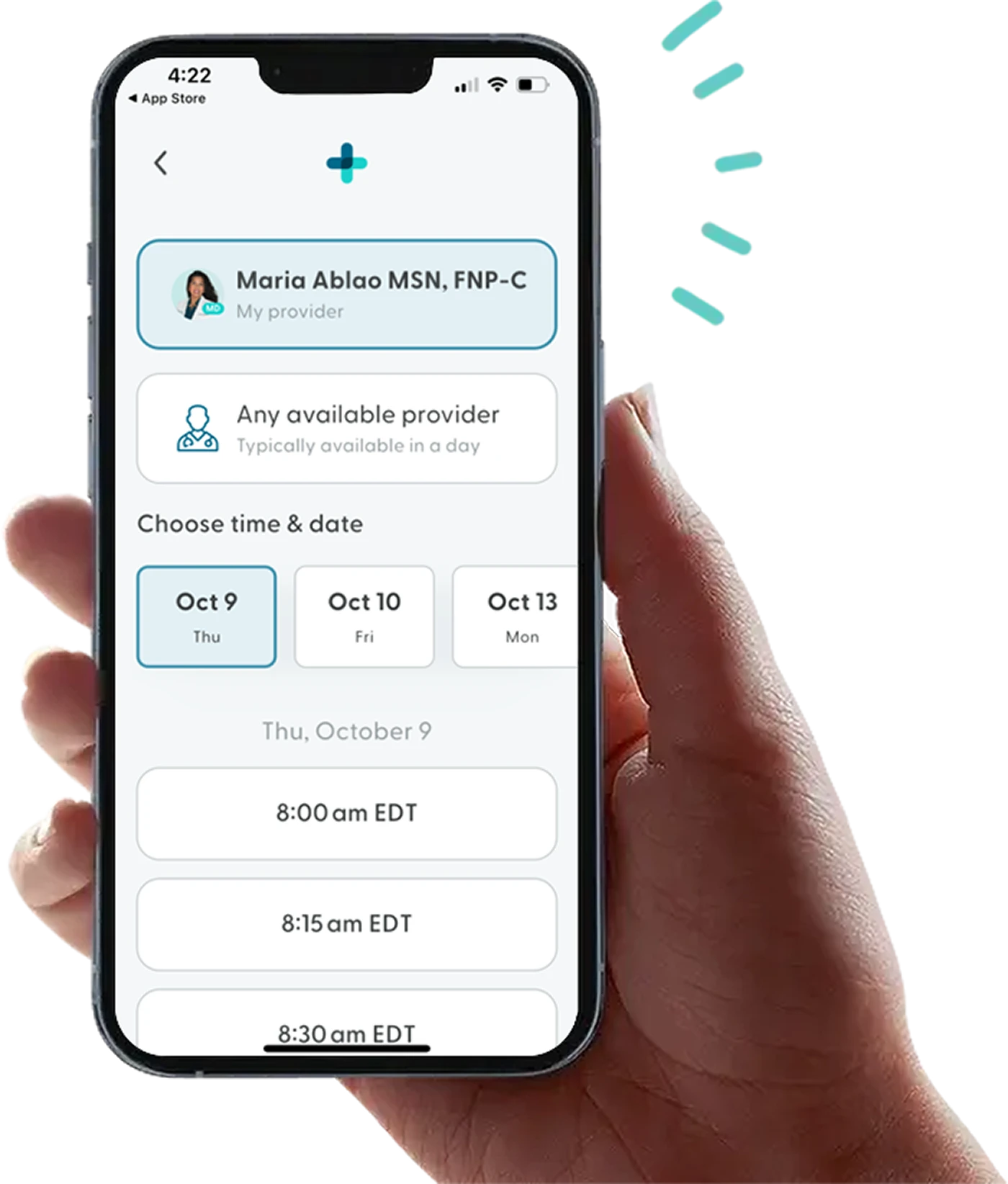What to Know About Menopausal Hormone Therapy and GLP-1s
Menopause is a transition that women typically start in their 40s and 50s. While every woman goes through menopause, the experience is unique for everyone.
One of the most common symptoms of menopause is weight gain. Women often see an increase in fat around the abdomen during menopause as estrogen levels fluctuate and the body makes adjustments for the postmenopausal period.
In addition to weight gain, postmenopausal women may experience hot flashes, intense mood swings, dizziness, changes in insulin sensitivity, brain fog, and other menopausal symptoms as well.
Fortunately, you don’t have to deal with menopausal symptoms on your own. Treatments like hormone replacement therapy help millions of women maintain their quality of life while dealing with symptoms. If weight gain specifically is a concern, a healthcare provider may recommend GLP-1s as part of your treatment plan.
Why Does Menopause Cause Weight Gain?
Menopausal weight gain is not necessarily a result of women not being physically active or eating well. In the beginning stages of menopause, women may experience changes to their body composition, muscle loss, and a slower metabolism due to estrogen loss. Estrogen also plays a role in signaling the brain sends to the body about appetite.
Studies show postmenopausal women also tend to experience a natural drop in energy. As hormones fluctuate, blood sugar levels may also spike in some women. Insulin resistance can occur during both perimenopause (early stages of menopause) and postmenopause.
What is Hormone Replacement Therapy (HRT)?
Hormone replacement therapy is a treatment to replace hormones like estrogen and progesterone. It works by restoring estrogen and progesterone to normal levels to establish hormonal balance and regulate bodily processes like mood, joint health, and more that involve hormones. Overall, HRT helps women to improve their quality of life by reducing the severity of common menopausal symptoms.
The following are the different methods available for HRT:
Skin patch
Injection
Tablet
Vaginal cream or ring
Implant
Estradiol gel or spray
How Hormone Replacement Therapy May Improve Menopausal Weight Gain
For postmenopausal women looking to lose weight, HRT is not a definite form of weight loss treatment. However, it can help with menopausal symptoms contributing to weight gain. For example, HRT may help you manage blood pressure and keep blood sugar levels from spiking.
Health experts found that these factors may also help with weight loss while treating these symptoms. Most women in this particular study used transdermal or oral estradiol. Still, more research is needed to determine the accuracy of these findings.
What are GLP-1s?
GLP-1s agonists are a group of medications prescribed to help manage weight loss and treat type 2 diabetes. The most popular GLP-1 medications are Wegovy (semaglutide), Ozempic (semaglutide), and Zepbound (tirzepatide).
Weight loss medications work by mimicking the action of the hormone GLP-1, which is naturally produced in the body. They promote weight loss by increasing insulin sensitivity, slowing gastric emptying, and reducing appetite. GLP-1s also affect parts of the brain, like the hypothalamus and brain stem, to help control appetite.
How GLP-1s Help with Menopausal Weight Gain
Most studies about menopausal weight gain and GLP-1s focus on the use of semaglutide or tirzepatide in postmenopausal women. GLP-1s like semaglutide and tirzepatide can help postmenopausal women target abdominal weight gain from menopause.
While health experts have found GLP-1s to be generally very effective for weight loss, there are very few studies on the effects of GLP-1s in postmenopausal women specifically. Still, the medications have shown widespread effectiveness in both adult men and women.
Along with prescribing weight loss medication, a healthcare provider may also recommend lifestyle and diet changes as part of your treatment plan. Getting an adequate amount of exercise and eating a well-balanced diet can help you maintain results from GLP-1s.
Can You Start Hormonal Therapy and Take GLP-1s at the Same Time?
In some cases, a healthcare provider may recommend a combination of HRT and GLP-1s as part of your treatment plan. Just using GLP-1s on their own may work slightly slower for women going through menopause.
Using both together may help reduce inflammation and increase energy levels in the body. This may help improve your metabolism, reduce the risk of cardiovascular disease, and prevent high cholesterol levels.
A licensed healthcare provider can help you determine if it’s safe for you to take both medications together. While rare, it’s possible for some women to experience an increase in muscle loss when using GLP-1s. A healthcare provider may recommend consuming more protein and engaging in resistance training to prevent sarcopenia (a loss in muscle mass).
Where Can I Learn More About Weight Loss?
It’s common for those diagnosed with type 2 diabetes to also have chronic obesity. If weight loss is an important health goal for you, LifeMD can help. The LifeMD Weight Management Program provides access to breakthrough GLP-1 medications, nutritional support, and guidance from licensed healthcare professionals.
Weight loss is a common concern for women as they age. Along with weight loss support, the LifeMD Women’s Health Program also offers treatments to help you navigate other common women’s health concerns like menopause. Soon, LifeMD will also offer HRT treatments for women experiencing hormonal imbalances and other changes to their health.
Get started today to jumpstart your weight loss journey and stay in the know about future LifeMD Women’s Health offerings.
More articles like this
Feel better with LifeMD.
Your doctor is online and ready to see you.
Join LifeMD for seamless, personalized care — combining expert medical guidance, convenient prescriptions, and 24/7 virtual access to urgent and primary care.










